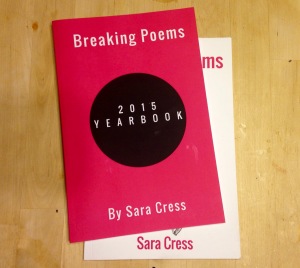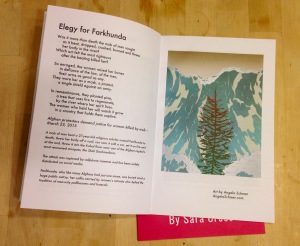To get the news from poems: Why Sara Cress’s “Breaking Poems” project is worth reading closely
March 30, 2016, by Allyn West
 Every night before bed, Sara Cress writes poetry in response to the headlines she’d spent the day surrounded by in her job. She posts most of her poems to her Tumblr site, but she has also published two slim volumes of them: Breaking Poems and 2015 Yearbook.
Every night before bed, Sara Cress writes poetry in response to the headlines she’d spent the day surrounded by in her job. She posts most of her poems to her Tumblr site, but she has also published two slim volumes of them: Breaking Poems and 2015 Yearbook.
She identifies with a migratory songbird, “a mere puff,” she writes. She grieves the attacks in Paris. She, like most of the Internet, laments the revelation that bacon is very likely carcinogenic.
Cress, who received her degree in creative writing from the University of Houston, is making two essential assumptions. One is that poetry has something to say to the news. You’re probably familiar with that William Carlos Williams phrase — if you’ve shopped at Barnes & Noble, you’ve seen it on a tote bag: “It is difficult / to get the news from poems / yet men die miserably every day / for lack / of what is found there.” For Cress, it seems so. There is something about poetry — its complexity, its empathy — worth taking to the news of the day. The day, that is, we live in now: a day on Twitter and Facebook and Instagram, scrolling, scrolling, where authority is dictated by “pageviews” and trending topics are flimsy as fame. “Poetry is the way I’ve always responded to sadness and frustration,” writes Cress in an email. “I started writing [the breaking poems] for me. … But a few months in I started to see that I was interpreting the news in a way that perhaps made it more palatable and heightened emotions about worn topics.”
It reminds me of something that James Kastely, Director of the Creative Writing Program at UH, once wrote: ““If there is any problem it is not that there is an excess of rhetoric but rather that there is not enough.”
Cress’s rhetoric is usually no-holds-barred. Her syntax whips into run-on sentences to keep up with the madness of yet another mass shooting on yet another American day — this time in San Bernadino. “No one could make out the ancient tongue,” she writes,
called it raving, called it wild.
the heavy judger of men! the vast stone of war!
The growl of the world became bolder.
All voices were god and no one listened
no one agreed on what was important
taking up arms swallowing dogma whole
until mangled tracts appeared on everyone’s skin
… the United States that coughs all night and won’t let us sleep
Sometimes she tries to out-absurd the absurd, when she spoofs poor Lululemon’s marketing campaign for a new set of leggings. “Feelings have always been important to humans,” the poem is titled, after that phrase appeared in the company’s marketing materials. And the poem becomes appropriately, preciously awkward in response:
“There are ten types of cries
and four solutions.
Are arms feeling sad now?
We cannot know the arms feel
any more than we can back-bend
our way to beautiful surf life.”
Beautiful surf life, take me away.
 The other assumption, here, is that poetry might help us contextualize the news, complicate it, empathize with the objects of public ridicule, can even humanize the ridiculers. If literature isn’t good at that, I don’t know what else it’s for. “The news can be dispiriting, which has led to a crazy amount of people avoiding it. And that enrages me,” she writes. “Our country, our society, our planet might be falling apart. … I feel a responsibility to stay informed, but I also feel compelled to respond.” When, for example, on March 7, a Houston woman — who, it turned out, was “talking about … Wall Street, the CIA, aliens” and was taken into custody by police to be evaluated for mental illness — danced completely naked on the cab of a semi stuck on 290, Cress quickly posted a pastiche of “This Is Just To Say” by William Carlos Williams:
The other assumption, here, is that poetry might help us contextualize the news, complicate it, empathize with the objects of public ridicule, can even humanize the ridiculers. If literature isn’t good at that, I don’t know what else it’s for. “The news can be dispiriting, which has led to a crazy amount of people avoiding it. And that enrages me,” she writes. “Our country, our society, our planet might be falling apart. … I feel a responsibility to stay informed, but I also feel compelled to respond.” When, for example, on March 7, a Houston woman — who, it turned out, was “talking about … Wall Street, the CIA, aliens” and was taken into custody by police to be evaluated for mental illness — danced completely naked on the cab of a semi stuck on 290, Cress quickly posted a pastiche of “This Is Just To Say” by William Carlos Williams:
I have eaten
the plums
that were in
the icebox
and which
you were probably
saving
for breakfast
Forgive me
they were delicious
so sweet
and so cold
Cress’s take:
I have danced
on the truck
that was on
290
and which
you were probably
behind
in traffic
Forgive me
I was happy
so drunk
and so cold
 OK, OK. It’s not great. But it’s smart. It comes from the woman’s voice. Yeah, it’s not really forgivable. You ate the plums, you jammed the traffic: what were you thinking? But the poem gives the woman at least some will of her own, some ability to recognize what she did and to comment, sheepishly, callously, unrepentantly, whatever, on it — a will that was taken from her by most of the other takes I came across that day in the Houston media. What the situation was was sad. But, for example, two local sports talkers on 97.5, A.J. Hoffman and Fred Faour, body-shamed the woman by using her performance as a segue into a commercial for Quick Weight Loss Centers.
OK, OK. It’s not great. But it’s smart. It comes from the woman’s voice. Yeah, it’s not really forgivable. You ate the plums, you jammed the traffic: what were you thinking? But the poem gives the woman at least some will of her own, some ability to recognize what she did and to comment, sheepishly, callously, unrepentantly, whatever, on it — a will that was taken from her by most of the other takes I came across that day in the Houston media. What the situation was was sad. But, for example, two local sports talkers on 97.5, A.J. Hoffman and Fred Faour, body-shamed the woman by using her performance as a segue into a commercial for Quick Weight Loss Centers.
I assume that this is the kind of nonsense that drives Cress crazy. “I’m trying to put faces and emotions to cold facts,” she writes, “and if I can lead someone to feeling sadness or outrage at the tenth school shooting story they’ve read in a month, then I think I’ve done some good.”
It’s enough to make her want to leave it all behind, as her second book comes to a close with “Astronaut application:”
Please take me to some place far from here.
Spin me up into the heavens,
and I will make the earthlings jealous
with photos of the moon’s quietude
and they’ll cry in their crumble towns
as they understand their fates.
… I am willing to do most anything.
Every day feels like a battle I am losing,
and I’ve heard that space sounds like bells.


I loved that book by Kazuo Ishiguro, “Never Let Me Go”. It´s so subtle and moving and I really feel society is heading in that direction.
I reviewed it on my blog and you´re welcome to check it out at:
http://www.ink2quill.com/never-let-me-go/2/
I love your website.
I2Q